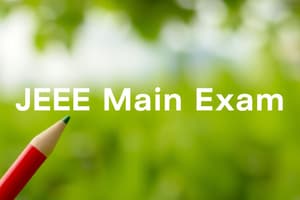Podcast
Questions and Answers
What is the format of questions in both Paper 1 and Paper 2 of the JEE Main exam?
What is the format of questions in both Paper 1 and Paper 2 of the JEE Main exam?
- Short answer questions
- Essay questions
- True/False questions
- Multiple-choice questions (correct)
Which of the following is NOT true regarding Paper 2 of the JEE Main exam?
Which of the following is NOT true regarding Paper 2 of the JEE Main exam?
- It has a time duration of 180 minutes
- It is mandatory for B.Arch courses at NITs
- It does not include Chemistry (correct)
- It covers Mathematics
For which type of questions in the JEE Main exam is there no negative marking?
For which type of questions in the JEE Main exam is there no negative marking?
- Multiple-choice questions
- Short answer questions
- Numerical Value Type questions (correct)
- True/False questions
What is the primary purpose of the JEE Main exam?
What is the primary purpose of the JEE Main exam?
Which paper is mandatory for all candidates seeking admission to undergraduate programs?
Which paper is mandatory for all candidates seeking admission to undergraduate programs?
What is significant about the time duration for each paper in the JEE Main exam?
What is significant about the time duration for each paper in the JEE Main exam?
What is the recommended strategy for students aiming for the best scores in the exam?
What is the recommended strategy for students aiming for the best scores in the exam?
In Paper 1, what is the subject-wise weightage percentage for Mathematics?
In Paper 1, what is the subject-wise weightage percentage for Mathematics?
Which topic from Class 12 Chemistry is not part of the JEE Main syllabus?
Which topic from Class 12 Chemistry is not part of the JEE Main syllabus?
What are the key topics covered in Physics Class 12 for the JEE Main exam?
What are the key topics covered in Physics Class 12 for the JEE Main exam?
According to the syllabus breakdown, which class covers the topic of Trigonometry in Mathematics?
According to the syllabus breakdown, which class covers the topic of Trigonometry in Mathematics?
What should students prioritize during the exam according to the text?
What should students prioritize during the exam according to the text?
Flashcards are hidden until you start studying
Study Notes
JEE Mains Exam Pattern, Syllabus, and Important Topics
The Joint Entrance Examination (JEE) is a national level competitive examination conducted by the National Testing Agency (NTA). It serves as the main gateway for admission into various engineering colleges in India, including the prestigious Indian Institutes of Technology (IITs), National Institutes of Technology (NITS), and other Centrally Funded Technical Institutions (CFTIs). This extensive guide covers the JEE Main's exam pattern, syllabus, and essential topics for each subject -- Physics, Chemistry, and Mathematics.
Exam Pattern
The JEE Main consists of two papers: Paper 1 (Physics and Chemistry) and Paper 2 (Mathematics). Both papers are compulsory for all candidates seeking admission to undergraduate programs, except those applying for admissions to NITs, IIITs, and CFTIs. However, only Paper 1 is mandatory for B.Arch courses offered by NITs and other institutes. Here are some key aspects of the exam pattern:
Format of Questions
All questions in both Paper 1 and Paper 2 will be objective type with multiple choices. There won't be any negative marking in Numerical Value Type questions. Thus, it is recommended to attempt every question regardless of its difficulty level.
Duration
Each paper has a duration of three hours, i.e., 180 minutes. From January 2023 onwards, there is a time gap between Papers 1 and 2.
Attempt Strategy
For the best possible scores, students should aim to finish all sections of their respective papers within the given time frame while attempting as many questions as possible. Remember, accuracy matters more than speed during the exam.
Subject Wise Weightage & Distribution
The distribution of marks among different subjects is as follows:
- Paper 1: Physics (30%), Chemistry (30%), Mathematics (40%)
- Paper 2: Mathematics (75%), Physics (25%)
Syllabus Breakdown
The JEE Main exam covers various topics from class 11th and class 12th. Here's a brief overview of the syllabus for each subject:
Physics
Class 11: General Principles of Newtonian Mechanics, Laws of Thermodynamics, Electromagnetic Induction, and Alternating Currents.
Class 12: Oscillations, Waves, Magnetism and Electrostatics, Electrons and Photons.
Chemistry
Class 11: Atomic Structure, Physical and Chemical Equilibrium, Redox Reactions, Hydrocarbons, Environmental Chemistry, Xenon, Noble Gases, Halogens, Alkali Metals, Alkaline Earth Metals, Transition Elements, Lanthanoids, Actinides, Coordination Compounds, Organic Compounds Containing Functional Group, Polymers, Chemistry in Everyday Life.
Class 12: Electrochemistry, Solid State, Solutions, Surface Chemistry, Nuclear Chemistry, Stereochemistry, and Block Elements.
Mathematics
Class 11: Trigonometry, Integration, Vectors, Functions, Complex Numbers, Probability, Infinite Series, Calculus, Matrices, and Differential Equations.
Class 12: Co-ordinate Geometry, Linear Programming, Binomial Theorem, Variables and Constants, Complex Numbers, Definite Integrals, Spherical Harmonics, Probability, Statistical Mechanics, and One Parameter Families.
Remember, understanding the fundamentals of these topics is crucial, rather than rote memorization. Additionally, solving previous year's question papers can help you get accustomed to the types of questions asked in the exam.
Studying That Suits You
Use AI to generate personalized quizzes and flashcards to suit your learning preferences.




